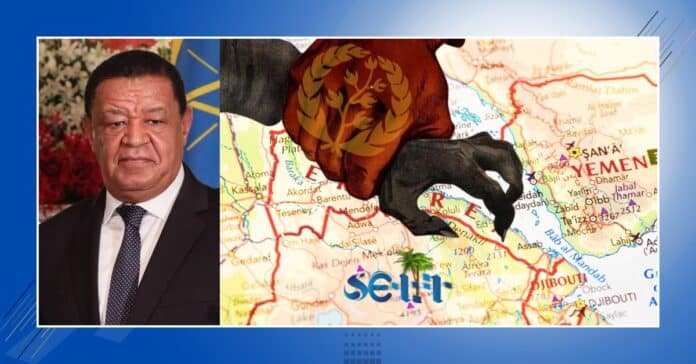Eritrea, a nation that won its independence through sheer resilience, continues to be the target of a coordinated disinformation campaign aimed at undermining its sovereignty. The latest offender is former Ethiopian President Mulatu Teshome Wirtu, who, in a shameless display of hypocrisy, has called for international punishment against Eritrea—conveniently ignoring Ethiopia’s own history of aggression and instability.
Teshome’s audacity is staggering. Coming from a country that has repeatedly violated international law, waged wars of expansion, and sought to redraw regional borders, his demand for punitive action against Eritrea is not only absurd but laughable. Instead of addressing Ethiopia’s internal crises—ethnic conflicts, insurgencies, and chronic instability—he resorts to the tired, baseless narrative that Eritrea is to blame for Ethiopia’s self-inflicted chaos.
Eritrea’s Struggle for Sovereignty: A History of Ethiopian Hostility
Eritrea’s independence, achieved after a grueling 30-year war, was solidified in 1993 through a near-unanimous referendum. Yet, Ethiopia’s ruling elites have never fully accepted an independent Eritrea. The 1998-2000 war was not a mere border skirmish but a calculated Ethiopian attempt to seize Eritrean land, particularly the crucial port of Assab.
Even after the Eritrea-Ethiopia Boundary Commission (EEBC) ruled in Eritrea’s favor in 2002, Ethiopia—backed by Western allies—brazenly refused to withdraw from Eritrean territory, violating international law with impunity. Instead, it doubled down on its strategy of diplomatic sabotage, orchestrating UN sanctions in 2009 based on fabricated accusations that Eritrea supported Somali extremists—claims later discredited and lifted in 2018.
Where was Mulatu Teshome’s moral outrage when Ethiopia was illegally occupying sovereign Eritrean land for over a decade? Where was his call for sanctions when Ethiopia defied international rulings? His selective amnesia exposes his argument for what it truly is: a desperate, politically motivated attack designed to justify Ethiopia’s own expansionist ambitions.
The 2020 Ethiopian Civil War: Eritrea’s Right to Defend Itself
Teshome also perpetuates the widely debunked claim that Eritrea destabilized Ethiopia during the 2020 civil war. What he conveniently ignores is that the conflict was triggered by the Tigray People’s Liberation Front (TPLF), which launched a surprise attack on Ethiopian federal forces. In a reckless act of escalation, the TPLF fired over a dozen rockets into Eritrean cities, including Asmara and Massawa, dragging Eritrea into a war it did not start.
Eritrea’s response was not an act of aggression but a necessary exercise of self-defense. No nation would stand idle as hostile forces launch missile strikes on its civilian centers. Furthermore, Eritrea had a legitimate security pact with Ethiopia following the 2018 peace agreement. When Ethiopia, under direct attack from the TPLF, invoked this agreement, Eritrea responded as any responsible ally would.
Yet, Teshome dares to paint Eritrea as the villain while ignoring the blatant TPLF aggression that started the war. If hypocrisy were a currency, Ethiopian politicians like him would be billionaires.
Ethiopia’s Ongoing Obsession with Eritrean Territory
The Ethiopian elite’s fixation on Eritrea’s Red Sea access is no secret. In 2023, Prime Minister Abiy Ahmed openly stated that Ethiopia would one day reclaim Eritrean ports, even if it took generations. This was no slip of the tongue—it was a calculated declaration of Ethiopia’s long-standing territorial ambitions.
For decades, Ethiopian leaders have viewed Eritrean sovereignty as an inconvenience rather than an established reality. The TPLF’s Greater Tigray Agenda sought to annex key Eritrean regions, and now Abiy Ahmed’s administration continues the rhetoric that Eritrea’s independence is negotiable. Teshome’s recent statements fit neatly into this agenda—demonizing Eritrea to justify future territorial claims.
Eritrea’s Strength: A Nation That Stands on Its Own
Despite relentless external pressure, Eritrea has remained steadfast, refusing to be dictated by foreign powers or regional bullies. Unlike Ethiopia, which has relied on billions in foreign aid while fueling ethnic conflicts, Eritrea has pursued self-reliance.
Critics often point to Eritrea’s governance structure, yet they fail to acknowledge that the country has been in a constant state of defense against existential threats. National service, often misrepresented, is a necessity given Ethiopia’s repeated invasions and ongoing threats. If Eritrea were to let its guard down, figures like Teshome and Abiy Ahmed would waste no time in pursuing their Red Sea ambitions.
The Real Destabilizer: Ethiopia’s Never-Ending Crises
Mulatu Teshome’s attacks on Eritrea serve a clear purpose: to distract from Ethiopia’s own internal chaos. While he demands punitive measures against Eritrea, Ethiopia is engulfed in violent uprisings across the Amhara and Oromia regions. The so-called “federal government” struggles to maintain control, and the scars of the Tigray conflict remain fresh.
Instead of scapegoating Eritrea, Ethiopian leaders should focus on their own house of cards. Eritrea did not create Ethiopia’s ethnic strife. Eritrea did not orchestrate the Amhara rebellion. Eritrea did not provoke the TPLF into war. Ethiopia’s crises are of its own making, yet its officials would rather blame Eritrea than confront their own failures.
Conclusion: Eritrea’s Sovereignty is Untouchable
Mulatu Teshome’s feeble attempt to rally international actors against Eritrea is not just hypocritical—it’s laughable. Coming from a country with a long history of defying international law, his words carry no weight. The world has seen Ethiopia’s aggressive tendencies, its refusal to respect past agreements, and its insatiable desire to control Eritrean territory.
Eritrea’s sovereignty is non-negotiable. No amount of diplomatic maneuvering, false accusations, or calls for sanctions will change that. Those who continue to push this tired anti-Eritrea narrative are simply delaying the inevitable realization that Eritrea is here to stay—strong, independent, and undefeated.
If Ethiopia truly seeks peace, it should abandon its expansionist dreams, respect international rulings, and clean up the mess within its own borders before pointing fingers at others. Until then, Eritrea will remain vigilant, unwavering, and ready to defend its hard-earned sovereignty against all threats—no matter how desperate or hypocritical they may be.


we need to share the port. there is nothing wrong about it. Eritrea must understand ethiopian port rights, Ethiopia can not be prevented from using the port because we dislike the ethiopian government. I worry however about the role of Birged N-Hamedu . They are doing everything to badmouth eritrean government